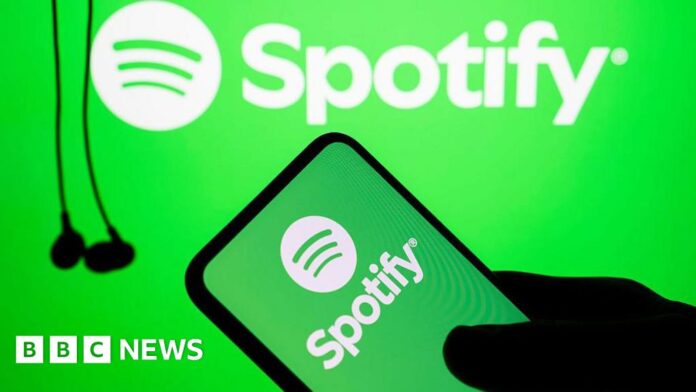Spotify, the world’s biggest music streaming service, has announced it is working with major labels on using artificial intelligence (AI) in a “responsible” way.
The firm said it wanted to make AI tools which “put artists and songwriters first” and respect their copyright.
The streaming giant will license music from the three record labels which make up the vast majority of the industry: Sony Music, Universal Music Group and Warner Music Group.
However, critics say adding more AI to the platform would result in less streaming revenue for human artists.
Also part of the deal are music rights firm Merlin and digital music company Believe.
It is unclear exactly what these AI tools will look like, but Spotify says it has already started working on its first products.
Spotify said it recognised there was a “wide range of views on use of generative music tools within the artistic community” and it planned to allow artists to choose if they wanted to participate.
It comes as a number of high-profile musicians such as Dua Lipa, Sir Elton John and Sir Paul McCartney have spoken out against AI companies training generative AI tools on their music without payment or permission.
Spotify said it would make sure artists, songwriters and rights holders were “properly compensated for uses of their work and transparently credited for their contributions”.
These would be through “upfront agreements” and not “asking for forgiveness later”.
“Technology should always serve artists, not the other way around,” said the firm’s co-president Alex Norstrom.
New Orleans-based artist management company MidCitizen Entertainment said AI has “polluted the creative ecosystem”.
Managing Partner Max Bonanno said AI-generated songs have “diluted the already limited share of revenue that artists receive from streaming royalties”.
But the announcement was welcomed by Ed Newton-Rex, founder of Fairly Trained, which campaigns for AI firms to respect creators’ rights.
“Lots of the AI industry is exploitative – AI built on people’s work without permission, served up to users who get no say in the matter,” he told BBC News.
“This is different – AI features built fairly, with artists’ permission, presented to fans as a voluntary add-on rather than an inescapable funnel of AI slop.
“The devil will be in the detail, but it looks like a move towards a more ethical AI industry, which is sorely needed.”
Spotify has always maintained it does not create any music itself, using AI or otherwise.
However, it does use the technology to create custom playlists, such as the “daylist” and its AI DJ.
It also hosts AI-generated music on its platform, and recently announced it was cracking down on artists who did not disclose the use of AI or who used it to impersonate real artists.
For example, a viral AI-generated song using voice clones of Drake and The Weeknd was removed from the streaming service in 2023.
The company also said AI is now used in many stages of the song-writing process – such as autotune, mixing and mastering.
The Beatles’ Grammy Award-winning last single Now and Then, released in 2023, used AI to clean up John Lennon’s voice from an old audio recording.
“We’ve been consistently focused on making sure AI works for artists and songwriters, not against them,” said Warner Music Group boss Robert Kyncl.
“That means collaborating with partners who understand the necessity for new AI licensing deals that protect and compensate rightsholders and the creative community.”



